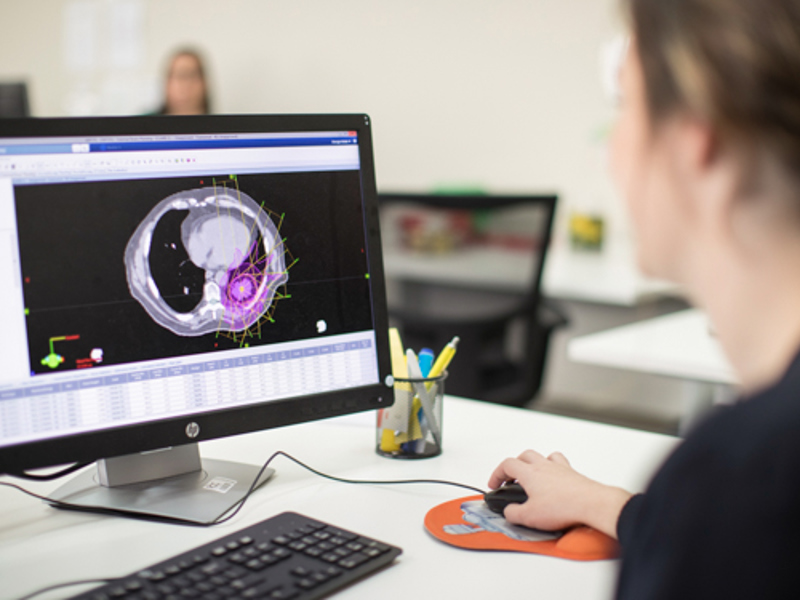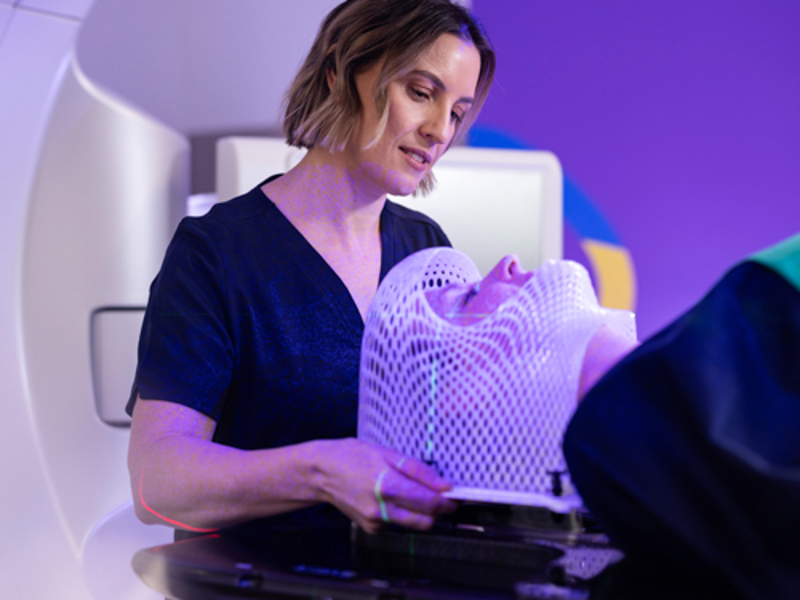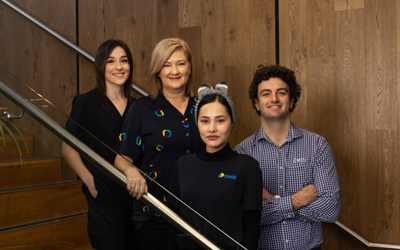Radiotherapy at Icon
We understand that starting radiotherapy can be very overwhelming. Knowing what to expect can help you prepare for treatment and ease any anxiety you may be feeling.
At Icon, we believe in a personal approach to radiotherapy. This means that you will receive a personalised radiotherapy plan for your specific needs.
Watch the video below to learn more about your first day of radiation therapy at Icon from our care team and patients.
Your first visit
At your first appointment, you will meet with your oncologist who will talk you through your diagnosis and treatment plan, including time frames. The type of radiotherapy you receive and the length of your treatment will depend on the type of cancer you have, your preferences and your general health. Make sure to ask any questions that will help you gain a good understanding of your diagnosis. Our team will be here to address them anytime during your treatment.
We encourage you to bring a family member, friend or carer to be part of this discussion. They can be there for support and can also ask any questions you may not think of. It’s normal to feel some anxiety at this time, and we are here to help you and your family work through this.
What do I need to bring with me?
Completed Registration, Medical History and Consent to Collect Information forms (unless these have already been provided to the centre)
Current referral letter from your referring practitioner (unless this has already been provided to the centre)
A list of your current medications including names, doses and frequency (your pharmacist will be able to provide you with an up-to-date list, or you may choose to bring in original packaging and scripts)
All X-rays, CTs, MRIs, bone and other radiological or nuclear medicine scans/reports you have obtained during the investigation of your medical condition
Pathology reports for blood and histopathology tests (your referring doctor may send these directly to us or give them to you)
Your radiotherapy planning session
Radiotherapy planning, also called a simulation session, is the first step in your radiation treatment. It is a practice run of your treatment without any radiation involved. At your appointment, our care team will review your personal medical history to determine the most appropriate way to treat you. This may take two to four hours and can involve multiple appointments.
We will collect you from the waiting room and may ask you to change into a gown before taking you into the simulation room. During this session, your care team will determine your radiotherapy treatment position. This will involve using a CT scanner, which identifies the exact location of your cancer and surrounding structures to localise the areas you are having treated. Extra equipment may be required to identify a specific position.
As this position needs to be accurately repeated throughout your treatment, you may require very small permanent and/or non-permanent marks to assist with this process. Any marks needed for your treatment will be fully explained during your planning session.
At the end of your planning session, your care team will talk to you about the session and answer any questions you may have. Your nurse will discuss how to care for your skin during radiotherapy and suggest appropriate clothing to wear during treatment. They will also let you know if you will need to prepare for your treatment before each appointment (for example, if you need to have a full or empty bladder).

Immobilisation masks and how they're made for treatment
Depending on the location of your cancer, you may also need an immobilisation device such as a mask to ensure you stay as still as possible throughout treatment.
Learn more about immobilisation masks and how they are made ahead of your radiation therapy treatment.

What to expect during your radiotherapy treatment
When starting radiotherapy, you will be set up in the same position you were in at your radiotherapy planning appointment. This might be checked with a CT scan or X-ray.
Once you have been correctly positioned, your care team will operate the machine from a control centre outside of the room. They will be there to monitor you throughout the treatment. There are microphones present if you need to speak with them.
You will not feel or see the radiation during your treatment, but you will hear the machine operating. It is important that you remain still until you are told that you can move. Each treatment session will only last 15 to 20 minutes.
Radiotherapy is scheduled over an extended period of time, usually from weeks to months, to ensure your sessions are as short as possible and that healthy cells can recover. Regular reviews will occur throughout your treatment. This is to ensure the treatment is progressing well and allow for any changes to your planned course of treatment. Nurses will regularly check in with you at your appointments to see how you are feeling and provide information and support.





